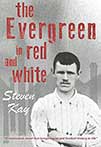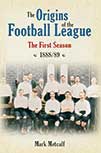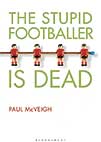 by Steven Kay
by Steven Kay
1889 Books, £8.99
Reviewed by Paul Brown
From WSC 327 May 2014
Rabbi Howell was the first footballer of Romany origin to play for England. A slight but skilful half-back, he was a star of the excellent Sheffield United team of the 1890s, alongside the better-remembered likes of William “Fatty” Foulke and Ernest “Nudger” Needham. “A Gipsy by birth, [Howell] perhaps owes some of his inexhaustible vitality to his lucky parentage,” wrote Needham of his team-mate. That “inexhaustible vitality” won Howell the nickname the “Evergreen”. But in 1898, despite his talents, and with United on the verge of securing their first League championship, Howell was hurriedly sold to Liverpool for reasons that remain unclear.
The “Wikipedia version” of Rabbi (or Rab) Howell’s story, sourced from club history books, suggests that he was booted out of United after being accused of deliberately throwing a game against championship rivals Sunderland by scoring two own goals. Author Steven Kay has never believed this version of events, and has been unable to find any evidence of match-fixing. He has, however, uncovered suggestions of a very different kind of scandal. Kay’s research forms the basis for a novel, The Evergreen In Red And White, a fictional account of Howell’s pivotal 1897-98 season.
This is football fiction based on fact, much like David Peace’s recent Red Or Dead, albeit with fewer and further-removed sources. Nevertheless, The Evergreen feels suitably authentic, set in an evocatively realised Victorian Sheffield during football’s thriving early years. Kay’s Howell has a quirky sense of humour, extrapolated from contemporary interviews, and a voice coloured with the use of Romany and Sheffield dialects. He rubs embrocation on swollen knees and worries about his waning football career, but it’s his personal life that proves to be his downfall.
The facts, as Kay has found them, are that when Howell moved from Sheffield to Liverpool he left behind a wife and four children – one of them a new-born baby – for another woman. In the novel, Howell meets the “other woman”, Ada, in Sheffield as the city prepares for the Diamond Jubilee visit of Queen Victoria. Torn between Ada and his pregnant wife, his football performances suffer and his season becomes derailed, culminating with the climactic match at Sunderland’s hostile Newcastle Road ground, where a tormented Howell scores those two fateful own goals. “If tha don’t keep things steady in life, it affects thi game,” Needham tells Howell, who is dropped from the team and effectively exiled from his home city.
Despite the defeat at Sunderland, Sheffield United did win the Championship. Howell was a Liverpool player by then. He subsequently played for Preston North End, where his career was ended by a broken leg in 1903. He did apparently find stability in his personal life – he married Ada, and the couple had five children. We may never know the whole truth about Howell and his hurried departure from Sheffield United, but Steven Kay’s novel is so diligently researched and affectionately written that it’s easy to believe the author’s claim in his introduction that it is “as close to the truth as is possible”.
 The first season 1888/89
The first season 1888/89 by Paul McVeigh
by Paul McVeigh
